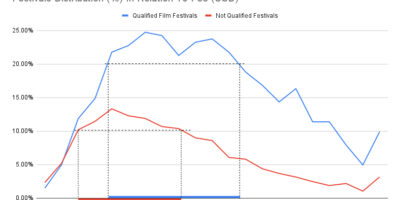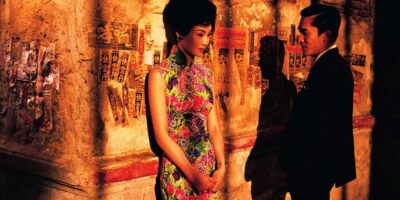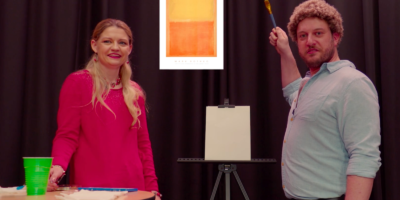by filmmaker Cameron Kit*
* Cameron Kit is an award-winning filmmaker and entrepreneur with over 13 years of experience in film and storytelling. She has directed over 30 films, and has won numerous awards including “Best Editing”, “Best Special Effects” and “Best Cinematography”. Her work has been featured in more than 15 festivals internationally, including the Richmond International Film Fest, Montreal Independent Film Festival, Tokyo International, Big Apple Film Festival and the Brooklyn SciFi Film Festival. In 2023, she started her own documentary filmmaking company, YOYOS. YOYOS is a documentary storytelling company that brings understanding and rapt attention to companies and individuals on the cutting edge of tech, medicine, and sustainability.
Cameron Kit is an award-winning filmmaker and entrepreneur with over 13 years of experience in film and storytelling. She has directed over 30 films, and has won numerous awards including “Best Editing”, “Best Special Effects” and “Best Cinematography”. Her work has been featured in more than 15 festivals internationally, including the Richmond International Film Fest, Montreal Independent Film Festival, Tokyo International, Big Apple Film Festival and the Brooklyn SciFi Film Festival. In 2023, she started her own documentary filmmaking company, YOYOS. YOYOS is a documentary storytelling company that brings understanding and rapt attention to companies and individuals on the cutting edge of tech, medicine, and sustainability.
“And for runner up best film…”Negative Space”!”
My jaw hit the floor. That was our 4th award that day, amidst dozens of amazing films in the Richmond 48 Hour Film Fest. The year was 2018. This was my first experience winning awards at a film festival, and it hooked me for like. I laughed with my crew and collapsed on the stage in joy. We had basically swept the awards…best editing, effects and cinematography and best film (runner up). The crew members there were laughing and hugging, we felt so vindicated, that our work was valued.
It’s not all about winning, it’s not all about laurels. But festivals can be a way to fuel your film career and drive it forward. A launchpad for meeting collaborators, celebrating your work and even getting distribution. While the big festival scenes (Sundance, SXSW, Tribeca, etc) are not the as accessible for indie filmmakers, smaller festivals and a strategy can be the difference between finishing a film and really promoting it.

Why do film festivals matter for filmmakers?
Exposure
For directors, film festivals are a vital platform for getting our work out there. My friend Andrew Lee Ryan, who recently had great success with his sci-fi short film Chimera on the festival circuit, shared some excellent insights that capture why festivals are so important. They give our films a chance to be seen and appreciated by audiences in a proper theater setting.

Watch Andrew’s incredible short film “Chimera” on DUST here.
Finding the right collaborators
I met one of my favorite film collaborators, Julia Reingold, at the Brooklyn Sci-Fi Film Fest. We were sitting next to each other. She seemed cool so I went for it and said “so you like sci-fi huh?” Like a cheesy pick up line. But it worked! We instantly clicked over our dream of creating feminist and optimistic sci-fi stories. One year later we were IN that very same festival, up on the screen.
This is the power of finding your niche.
Validation
Let’s face it. Making a film is HARD. Expensive, time consuming, and vulnerable. Getting accepted into a film festival, seeing your work on the big screen and having a way for friends, family and crew to celebrate your work really matters. A festival acceptance can give you that little dose of serotonin you need to keep going. You can stack up laurels on your website (guilty). You can put them on the poster. Just don’t get addicted to this form of validation as the only sign of success.
Networking
Meeting the crew of other films you like is one fabulous part of festivals. You meet like-minded filmmakers and can even find a great DP! And you can also get gigs this way. Don’t be afraid to follow up and ask for work from people you click with. Go to the events. Go to the after parties. Walk up to people who made films you liked. I asked Andrew Lee Ryan to come on my podcast after seeing his short film, “Chimera”. Now he’s my friend and I interviewed him for this article!
Festivals also offer networking opportunities to connect with other talented filmmakers and potentially forge new creative partnerships. You never know when you might meet your next producer, cinematographer, or script collaborator at a festival. The Q&As are great for engaging directly with audience members passionate about the art of filmmaking. For a self-financed filmmaker operating without corporate support, getting that kind of organic buzz and industry attention is invaluable.
The top-tier festivals like Sundance, SXSW, and Tribeca obviously get the most hype and can be pot of gold for indie filmmakers – both in terms of exposure and because they’re qualifiers for prestigious awards like the Oscars. Andrew made an insightful point that they’re extremely difficult to get into from the outside. The acceptance rates are tiny, and you’re going up against films with major names and budgets attached. His advice? “Submit to your upper-tier reaches, stick to local and high probability festivals, and take some calculated risks on some properly researched newcomers and foreign festivals.”
That said, being an official selection at marquee festivals that are heavily sponsored by major brands like SXSW can be a huge boon for an indie. Having your film screen at Nike’s kickass experiential event or Amazon’s buzzworthy installation puts you on the radar of those taste-making brands in a way that could lead to future collaborations.
While getting into those top-tier festivals is the dream, I’ve found tremendous value working the rest of the circuit – embracing local festivals in my own community, taking calculated risks on up-and-coming ones, and selectively submitting to niche genre/cause-focused festivals where my work is a natural fit. Each opportunity to screen allows me to engage with audiences, network with other filmmakers, and inch my personal brand a bit further into the collective consciousness.

For brands, especially ones trying to connect with a younger, culturally-engaged demographic, film festivals provide unmatched opportunities. Having your brand’s logo prominently featured as a sponsor gets your name out there to a highly targeted audience of art lovers and tastemakers. You could even get more involved by having an experiential activation at the festival itself.
If the brand has a strong social responsibility element, such as being eco-friendly or supporting underrepresented voices, aligning with a specific social cause-related festival is a perfect way to reinforce those values. Many festivals organize around genres, locations, diversity causes, etc.
Hosting a panel or event at a festival puts the brand in a thought leadership position surrounded by talented, passionate creatives. As someone trying to work with more innovative brands in the tech space for my documentaries, I’d be thrilled to be part of an event mixing tech, art and film.
Promotion:
When we asked Joe Carabeo, a filmmaker and head of 2 film festivals (AwesomeCon Film Fest and DC Shorts) about his advice for filmmakers he said:
“I always like to tell any new filmmakers that making the film is just half the battle, now it’s time to get people, not just your family and friends, to see your work, And that’s up to you. Now you’ve become the salesman. Get them in the door.
Also, be gracious and thankful to everyone that has given you their time to read your script, work on your film and watch your movie and give you feedback. These days there are so many distractions and supposedly more important things people can be doing. So think about that and make the experience worth the time for the audience and yourself.”
At the end of the day, film festivals are a business and need to be profitable to survive. As Andrew bluntly stated, “many festivals…are profiting off of your hope” through steep submission fees. They have incentives to program sellable, crowd-pleasing films over lesser-known gems.

That said, the good festivals do provide value in the form of screening and networking opportunities. The passionate curators want to create a space for celebrating and elevating quality artistic works. They’re taking risks and hustling to make their festivals sustainable. I deeply respect the festivals being truly mission-driven to elevate underrepresented voices and stories.
Ultimately, film festivals serve an invaluable purpose for creators – helping talented, unique visions and stories have a chance to break through the clutter and get the recognition they deserve. As Andrew eloquently summarized, “If you’re in this for the long haul…you won’t care what happens. Denied from a hundred film festivals? Learn from it and make another film. If you’re getting better, someone will eventually notice you and that’s what film festivals do.”
But these festivals aren’t just for filmmakers and creators. There is an untapped well of opportunity for the brands that fund content.
How brands and others can benefit from film festivals:
For the documentary about FFS and the journey of Kimi, a trans woman recieving gender affirming care, the film festivals we enter will be a platform for Kimi to share her gofundme link to help her fundraise for her second surgery (assuming we get in). For J&J, who funded the film, film festival wins are a way to associate their name with the powerful work they do and creates another set of content to promote and share. Press releases, photos from the red carpet and even reviews. If the film wins an award, it adds further legitimacy.
Personal Branding – Life Story Docs
For individuals who I make a life-story documentary about for YOYOS, the film festivals offer more content, awareness and excitement around them. Not only is thier story memorialized in a powerful film, but to have that story recognized, as we have with Neeti’s Story, elevates the brand for the person featured. This can help them get a TED-Talk, a book, a promotion, whatever next step they are looking for.

I’m so grateful for the festivals elevating important documentary work, narrative work and the opportunities they provide. While there’s no guarantee of overnight success, I’m committed to putting my passion projects out there and seeing where this winding festival journey leads. The path is never predictable, but that’s part of what makes the ride so exhilarating. Here’s to embracing the festival grind!
ALL ARTICLES:















